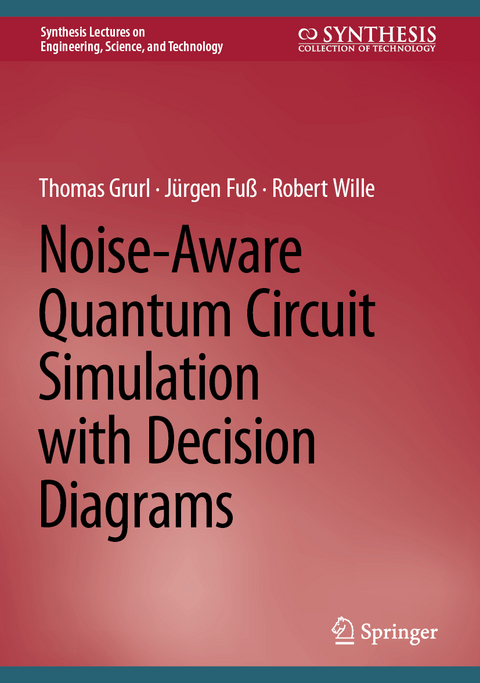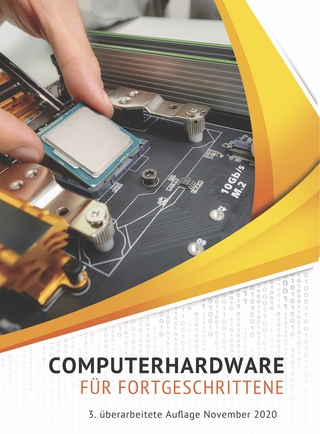
Noise-Aware Quantum Circuit Simulation with Decision Diagrams
Springer International Publishing (Verlag)
978-3-031-71035-3 (ISBN)
This book provides an easy-to-read introduction to quantum computing, as well the classical simulation of quantum circuits with common types of error effects. The authors showcase the enormous potential that can be unleashed when doing these simulations using decision diagrams-a data-structure common in the design automation community, often used in quantum computing design tasks. The algorithms and methods described can outperform previously proposed solutions in some cases, providing a complementary solution to established approaches. Finally, the necessity of noise-aware classical quantum circuit simulation is demonstrated through a practical use-case: the evaluation of quantum error correcting codes.
Thomas Grurl is a post-doctoral researcher at the University of Applied Sciences Upper Austria (Austria) and completed his PhD in 2023 at the Johannes Kepler University Linz. Before that, he received his BSc and MSc in Secure Information Systems at the University of Applied Sciences Upper Austria in 2015 and 2017, respectively. His research interests include secure information systems, design automation for quantum computing and in this domain specifically noise-aware classical quantum circuit simulation and efficient data structures. In this area, he has published several peer-reviewed papers at international conferences and journals such as the IEEE Transactions on Computer Aided Design of Integrated Circuits and Systems (TCAD), the Design, Automation and Test in Europe (DATE) conference, the International Symposium on Multiple-Valued Logic (ISMVL), the conference on VLSI Design, and the International Conference on Computer-Aided Design (ICCAD). For his work, he has won the Best Student Paper Award at the VLSI Design 2023.
Jürgen Fuß studied Mathematics at the Johannes Kepler University Linz, where he has been working as a researcher at the Department of Algebra in group theory for several years after having completed his doctorate. In 2003 he became a Professor of Applied Mathematics and Cryptography at the University of Applied Sciences Upper Austria at Hagenberg, Austria. He was a guest lecturer at Karlstads Universitet in Sweden in 2008 and 2013. He worked in the field of cryptanalytic applications of high performance computing technology and started a research group for quantum computing, quantum computing simulation and post-quantum cryptography in 2017. He loves to work with people from different fields and to contribute, he has thus published in a variety of journals from the International Journal of Algebra and Computation, the Proceedings of the ACM Workshop on Privacy in the Electronic Society, the International Conference on Availability, Reliability and Security (ARES), the IEEE Transactions on Mobile Computing and more.
Robert Wille is a Full and Distinguished Professor at the Technical University of Munich, Germany, and Chief Scientific Officer at the Software Competence Center Hagenberg GmbH, Austria. From 2002 to 2006, Robert Wille studied Computer Science (Diploma) at the University of Bremen. After successfully completing his doctorate in 2009 (summa cum laude), he worked as postdoc at the University of Bremen and, since 2013, as Senior Researcher in the Cyber-Physical Systems department of the German Research Center for Artificial Intelligence (DFKI). Besides that, he served as lecturer at the University of Applied Science Bremen from 2010 to 2012 and was guest professor at the University of Potsdam in 2012 as well as the Technical University of Dresden in 2013/2014. From 2015 to 2022, he was Full Professor at the Johannes Kepler University Linz and head of the Institute for Integrated Circuits (at the age of 32 and as one of the youngest full professors in the field). In 2019, he founded the LIT Secure and Correct Systems Lab at JKU and, in 2020, he additionally became Chief Scientific Officer at the Software Competence Center Hagenberg GmbH. Since 2022, he works in Munich-appointed through a "Leuchtturm"-procedure (i.e., direct appointment) and, additionally, through the "Distinguished Professorship"-program. His research interests are in the design of circuits and systems for both conventional and emerging technologies. In these areas, he published more than 400 papers and served in editorial boards as well as program committees of numerous journals/conferences such as TCAD, ASP-DAC, DAC, DATE, and ICCAD. For his research, he was awarded, e.g., with Best Paper Awards, e.g., at TCAD and ICCAD, an ERC Consolidator Grant, a Distinguished and a Lighthouse Professor appointment, a Google Research Award, and more.
Introduction.- Background.- Quantum Circuit Simulation With Decision Diagrams.- Decision Diagrams for Density Matrices.- Deterministic Simulation of Noise.- Stochastic Simulation of Noise.- Error Correction Framework.- Conclusion.
| Erscheinungsdatum | 01.12.2024 |
|---|---|
| Reihe/Serie | Synthesis Lectures on Engineering, Science, and Technology |
| Zusatzinfo | XIII, 108 p. 26 illus., 21 illus. in color. |
| Verlagsort | Cham |
| Sprache | englisch |
| Maße | 168 x 240 mm |
| Themenwelt | Mathematik / Informatik ► Informatik ► Theorie / Studium |
| Informatik ► Weitere Themen ► Hardware | |
| Technik ► Elektrotechnik / Energietechnik | |
| Schlagworte | Decision Diagrams • Design Automation for Quantum Computing • Quantum Computation • Quantum information • Quantum Logic |
| ISBN-10 | 3-031-71035-5 / 3031710355 |
| ISBN-13 | 978-3-031-71035-3 / 9783031710353 |
| Zustand | Neuware |
| Informationen gemäß Produktsicherheitsverordnung (GPSR) | |
| Haben Sie eine Frage zum Produkt? |
aus dem Bereich


